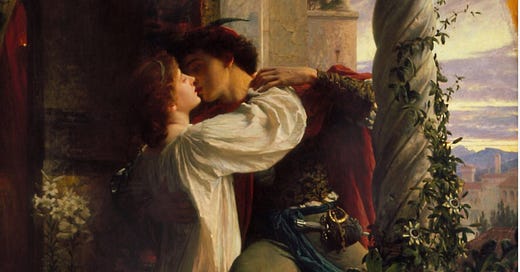I’m in Verona, visiting friends and have come back from a day touring this magnificent city. It’s steeped in so much real history that it’s funny to see huge queues for a fake places: namely, Juliet’s balcony. Shakespeare never set foot in this city yet his play created Verona’s biggest claim on the world’s attention. And all through a love story that wasn’t even his. But does that matter?
This got me thinking about a conversation I had at The Times office drinks a few days ago with some of its brilliant trainees. Can any story truly be your story? Journalists seldom have much time to research and rely hugely on what others tell them. Our job is to retell the story well - and, most of all, accurately and quickly. Make calls, check sources - but often it’s putting together your work from that which has already been done. There is usually one byline. But is it yours? Or does your mix, your edit of three or four people’s story make it yours?
At The Spectator we’d often put teams of people on a story that was only ever going to have one person’s byline. I banned joint bylines: you can’t credit every researcher, sub-editor, rewriter, etc. Every article means teamwork. Any cover piece that had my name on it would have, for example, been fact-checked (and perhaps researched) by John O’Neill, the idea probably came from James Forsyth, run past Katy Balls, polished and de-wonked by Lara Prendergast before being subbed by Emma Byrne. Such teamwork, I’ve always thought, is why writers stay with publications. It’s hard to find anything like this as a solo freelance writer.
The NYT’s David Brooks once said he regards himself more of a rewriter than a writer, because his analysis is so heavily informed by books he reads. I could list you my biggest influences: Johan Norberg, Neal Ascherson, Peggy Noonan and many others. But each of them might point back to other names. Writing, like so much of any creative process, is a synthesis.
As was Romeo and Juliet. The tale was first told by da Porto, a Venetian nobleman, published posthumously in 1530. Set in fair Verona. He claims to have heard the tale from a soldier. It was then reincarnated in a book of short stories by Bandello, a monk, in 1554. Then into English as Arthur Brooke’s epic poem The Tragical History of Romeus and Juliet (1562). The tale was then immortalised, transformed for the stage and mankind, by Shakespeare in 1595.
Shakespeare had no time to think up original stories. His theatre company, the Lord Chamberlain’s Men, had just begun performing at London’s playhouses after a long plague closure. But he used his trademark devices to transform Brooke’s 3,000-word poem. He added characters, comedy, psychology, condensed the plot into four days and built the character of Juliet into witty, brave - and quite emotionally mature for a girl scripted as a 13 year-old. A girl who “has not seen the change of 14 years” (Act1 scene 2).
It was someone else’s story - but Shakespeare shaped the characters, the words, the scenes, the drama. There’s also no record of him having a writing team: this was a genuine genius, writing defining works of our literature to be performed centuries after. It’s hard to learn too much by analysing genius: it’s just there. The balcony scene was Shakespeare’s. No previous version had anything like it.
My point: if some of the greatest literature in the world can be derivative, then there’s no shame in far-lower mortals spending a career on their own retellings, their own remixes. And being proud if we manage to take it forward a small stage: because it’s all about stages. I’ve always thought that all great inventions tend to have:-
An inventor, who comes up with it but usually no one notices (de Porto)
A populariser, who brings it to a mass audience (Brooke)
A commercialiser, who makes it go global (Shakespeare)
Journalism tends to fall in the second category: to find out what has happened, to take it to a wider audience. The journalism can go on to have huge effects. Bill Gates said he started his charity - the world’s largest philanthropic endeavour - after a Nicholas Kristof article about the number of Africans who die from easily-treatable diarrhoea. At work, I walk past a picture of William Howard Russel who reported from Crimea for The Times. When he wrote how “our soldiers die without the consolations of religion and are buried like dogs” it led to public outcry and the dispatch of Florence Nightingale, with revolutionary results. Keith Murdoch, father of Rupert, was a war reporter in Gallipoli in 1915. His private 25-page letter about the scandal of what he witnessed there changed the course of the war.
Ideally, journalists would have a long time to investigate, unearth - then expose. Realistically, we do it all on a very condensed timeframe. We cannot change the world. As politicians like to say: we write and they do. But I’ve always been big-headed enough to think that journalism, if done properly, can make a difference. To shine a light, to tell a story - even one already out there - in a way that captures people’s attention can be a great public service.
And that’s what’s been on my mind after touring this gorgeous city. If Shakespeare could take a borrowed tale and turn it into Juliet’s balcony then journalists can take second-hand facts and - if we’re lucky - turn them into something that makes people look up.




Excellent article ,Thankyou .I well remember visiting Verona when I lived in Italy,not least for its' wonderful opera festival.Fascinsting the origins of the story.
I love this, a perfect example of what you’re saying. A truth well told . . . I’m a captivating style.